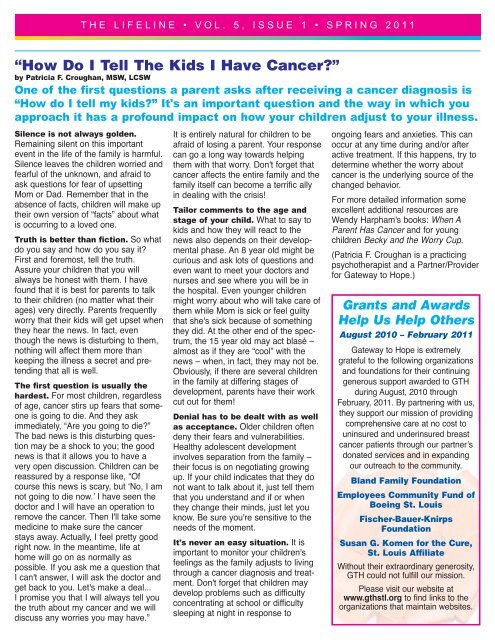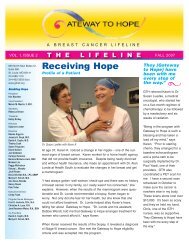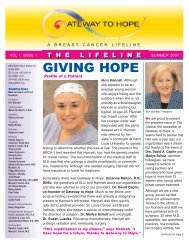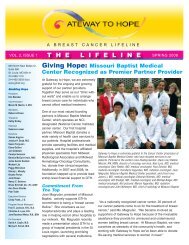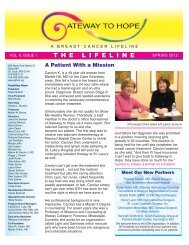You also want an ePaper? Increase the reach of your titles
YUMPU automatically turns print PDFs into web optimized ePapers that Google loves.
GTH Newsletter-SPRING 2011_L<strong>ayout</strong> 1 3/16/11 3:03 PM Page 9<br />
T h e L I F e L I N e • V O L . 5 , I S S U e 1 • S P R I N G 2 0 1 1<br />
“How Do I Tell The Kids I Have Cancer?”<br />
by Patricia F. Croughan, MSW, LCSW<br />
One of the first questions a parent asks after receiving a cancer diagnosis is<br />
“How do I tell my kids?” It's an important question and the way in which you<br />
approach it has a profound impact on how your children adjust to your illness.<br />
Silence is not always golden.<br />
Remaining silent on this important<br />
event in the life of the family is harmful.<br />
Silence leaves the children worried and<br />
fearful of the unknown, and afraid to<br />
ask questions for fear of upsetting<br />
Mom or Dad. Remember that in the<br />
absence of facts, children will make up<br />
their own version of “facts” about what<br />
is occurring to a loved one.<br />
Truth is better than fiction. So what<br />
do you say and how do you say it?<br />
First and foremost, tell the truth.<br />
Assure your children that you will<br />
always be honest with them. I have<br />
found that it is best for parents to talk<br />
to their children (no matter what their<br />
ages) very directly. Parents frequently<br />
worry that their kids will get upset when<br />
they hear the news. In fact, even<br />
though the news is disturbing to them,<br />
nothing will affect them more than<br />
keeping the illness a secret and pretending<br />
that all is well.<br />
The first question is usually the<br />
hardest. For most children, regardless<br />
of age, cancer stirs up fears that someone<br />
is going to die. And they ask<br />
immediately, “Are you going to die?”<br />
The bad news is this disturbing question<br />
may be a shock to you; the good<br />
news is that it allows you to have a<br />
very open discussion. Children can be<br />
reassured by a response like, “Of<br />
course this news is scary, but ‘No, I am<br />
not going to die now.’ I have seen the<br />
doctor and I will have an operation to<br />
remove the cancer. Then I'll take some<br />
medicine to make sure the cancer<br />
stays away. Actually, I feel pretty good<br />
right now. In the meantime, life at<br />
home will go on as normally as<br />
possible. If you ask me a question that<br />
I can't answer, I will ask the doctor and<br />
get back to you. Let's make a deal...<br />
I promise you that I will always tell you<br />
the truth about my cancer and we will<br />
discuss any worries you may have.”<br />
It is entirely natural for children to be<br />
afraid of losing a parent. Your response<br />
can go a long way towards helping<br />
them with that worry. Don't forget that<br />
cancer affects the entire family and the<br />
family itself can become a terrific ally<br />
in dealing with the crisis!<br />
Tailor comments to the age and<br />
stage of your child. What to say to<br />
kids and how they will react to the<br />
news also depends on their developmental<br />
phase. An 8 year old might be<br />
curious and ask lots of questions and<br />
even want to meet your doctors and<br />
nurses and see where you will be in<br />
the hospital. Even younger children<br />
might worry about who will take care of<br />
them while Mom is sick or feel guilty<br />
that she's sick because of something<br />
they did. At the other end of the spectrum,<br />
the 15 year old may act blasé –<br />
almost as if they are “cool” with the<br />
news – when, in fact, they may not be.<br />
Obviously, if there are several children<br />
in the family at differing stages of<br />
development, parents have their work<br />
cut out for them!<br />
Denial has to be dealt with as well<br />
as acceptance. Older children often<br />
deny their fears and vulnerabilities.<br />
Healthy adolescent development<br />
involves separation from the family –<br />
their focus is on negotiating growing<br />
up. If your child indicates that they do<br />
not want to talk about it, just tell them<br />
that you understand and if or when<br />
they change their minds, just let you<br />
know. Be sure you're sensitive to the<br />
needs of the moment.<br />
It's never an easy situation. It is<br />
important to monitor your children's<br />
feelings as the family adjusts to living<br />
through a cancer diagnosis and treatment.<br />
Don't forget that children may<br />
develop problems such as difficulty<br />
concentrating at school or difficulty<br />
sleeping at night in response to<br />
ongoing fears and anxieties. This can<br />
occur at any time during and/or after<br />
active treatment. If this happens, try to<br />
determine whether the worry about<br />
cancer is the underlying source of the<br />
changed behavior.<br />
For more detailed information some<br />
excellent additional resources are<br />
Wendy Harpham's books: When A<br />
Parent Has Cancer and for young<br />
children Becky and the Worry Cup.<br />
(Patricia F. Croughan is a practicing<br />
psychotherapist and a Partner/Provider<br />
for <strong>Gateway</strong> to <strong>Hope</strong>.)<br />
Grants and Awards<br />
Help Us Help Others<br />
August 2010 – February 2011<br />
<strong>Gateway</strong> to <strong>Hope</strong> is extremely<br />
grateful to the following organizations<br />
and foundations for their continuing<br />
generous support awarded to GTH<br />
during August, 2010 through<br />
February, 2011. By partnering with us,<br />
they support our mission of providing<br />
comprehensive care at no cost to<br />
uninsured and underinsured breast<br />
cancer patients through our partner’s<br />
donated services and in expanding<br />
our outreach to the community.<br />
Bland Family Foundation<br />
Employees Community Fund of<br />
Boeing St. Louis<br />
Fischer-Bauer-Knirps<br />
Foundation<br />
Susan G. Komen for the Cure,<br />
St. Louis Affiliate<br />
Without their extraordinary generosity,<br />
GTH could not fulfill our mission.<br />
Please visit our website at<br />
www.gthstl.org to find links to the<br />
organizations that maintain websites.


